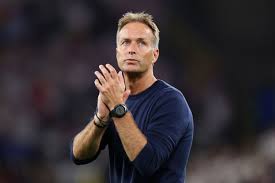Kasper Hjulmand has officially stepped down as the head coach of the Denmark national football team, marking the end of a significant era in Danish football. Hjulmand’s tenure, which began in 2020, saw Denmark achieve remarkable successes and face unprecedented challenges. His departure comes as a surprise to many fans and analysts, sparking discussions about his legacy and the future direction of the team.
Hjulmand’s Impact on Danish Football
Hjulmand took over the Danish national team in 2020, succeeding Åge Hareide. His appointment was met with high expectations, and he did not disappoint. Under his leadership, Denmark reached the semi-finals of Euro 2020, a feat that reignited national pride and enthusiasm for Danish football. The team’s performance was especially notable for its resilience and spirit, particularly after the cardiac arrest incident involving Christian Eriksen during the tournament.
Hjulmand’s coaching style, characterized by tactical flexibility, team cohesion, and a strong emphasis on attacking football, brought a refreshing change to the Danish side. He successfully integrated young talents into the squad while maintaining a solid core of experienced players, creating a balanced and dynamic team.
Achievements and Challenges
During his tenure, Hjulmand led Denmark to several significant accomplishments:
- Euro 2020 Semi-Finals: Denmark’s journey to the semi-finals of Euro 2020 was a highlight of Hjulmand’s tenure. The team demonstrated exceptional performance, overcoming adversity and showcasing remarkable teamwork and skill.
- World Cup Qualifiers: Under Hjulmand, Denmark qualified for the 2022 FIFA World Cup with an impressive campaign, securing their spot with a series of dominant performances.
- Fostering Talent: Hjulmand was instrumental in the development of young players, providing them with opportunities to shine on the international stage. His trust in emerging talents paid off, as many of these players became key contributors to the team.
However, Hjulmand’s tenure was not without its challenges. The emotional toll of Eriksen’s incident at Euro 2020 and the subsequent pressure on the team were significant hurdles. Despite these difficulties, Hjulmand’s leadership and the team’s solidarity helped them navigate through tough times.
Reasons for Stepping Down
While specific reasons for Hjulmand’s departure have not been detailed extensively, it is understood that the decision was made amicably between him and the Danish Football Association (DBU). In a statement, Hjulmand expressed his gratitude for the opportunity to lead the national team and his pride in their achievements.
“I am incredibly proud of what we have achieved together. It has been an honor to coach this team, and I am grateful for the support from the players, staff, and fans. It’s time for a new chapter, and I believe the future of Danish football is bright,” Hjulmand said.
Future Prospects for Denmark
As Denmark looks ahead, the focus will be on finding a successor who can build on Hjulmand’s legacy and continue to steer the team towards success. The DBU is expected to conduct a thorough search for a new head coach, considering candidates who can uphold the values and style that have defined Danish football in recent years.
The team’s solid foundation, bolstered by experienced veterans and promising young talents, positions them well for future competitions. The upcoming World Cup will be a critical test for Denmark, and the new coach will need to quickly integrate into the team and continue the work started by Hjulmand.
Conclusion
Kasper Hjulmand’s departure as Denmark’s head coach marks the end of a notable chapter in Danish football. His tenure brought significant achievements, resilience, and a revitalized spirit to the national team. As Denmark prepares for the future, the impact of Hjulmand’s leadership will be remembered, and his contributions will serve as a foundation for the team’s continued success.
ALSO READ:Zharnel Hughes Aims to ‘Rewrite History’ at Paris Olympics


